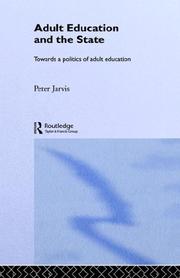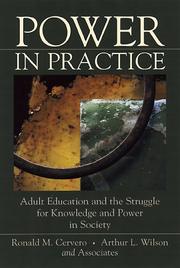| Listing 1 - 10 of 34 | << page >> |
Sort by
|

ISBN: 0415065321 Year: 1993 Publisher: London Routledge and Kegan Paul
Abstract | Keywords | Export | Availability | Bookmark
 Loading...
Loading...Choose an application
- Reference Manager
- EndNote
- RefWorks (Direct export to RefWorks)
Book
ISBN: 3571090535 Year: 1973 Publisher: Dusseldorf Bertelsmann Universitätsverlag
Abstract | Keywords | Export | Availability | Bookmark
 Loading...
Loading...Choose an application
- Reference Manager
- EndNote
- RefWorks (Direct export to RefWorks)
Book
Year: 2013 Publisher: Podgorica : Centar za građansko obrazovanje (CGO),
Abstract | Keywords | Export | Availability | Bookmark
 Loading...
Loading...Choose an application
- Reference Manager
- EndNote
- RefWorks (Direct export to RefWorks)
Education represents a key sector for the development and advancement of any society. In Montenegrin political and economic discus education dominates as a key resource of the overall development. In this context, in the last decade, substantial efforts have been made, as well as significant resources allocated, in order to improve and modernize national education system. Permanent intention of the education system is to uphold further development of Montenegro as civic, democratic and social justice state, based on the rule of law and to provide key contribution to economic and social development of the country, especially through fostering and further advancement of human rights and fundamental freedoms. The textbooks still represent the main teaching tool, through which students gain adequate knowledge and skills. Importance and power of the textbooks is great indeed, because it legitimately provides for transfer of socially desirable knowledge, values and behavior patterns to young generations. For that reason it is important that equality, tolerance and social acceptance of LGBT persons are to be found in them. Teaching communication is realized through textbooks. It is gradually complemented by other means and achievements of information technology. We can conclude that in the last decade Montenegrin textbooks have undergone significant qualitative development in terms of the content, structure, graphic and visual equipment and total visual identity. Every textbook is based on the course curriculum. Even though the educational system is mainly centralized, and relatively limited number of people is involved in creation of educational policy and preparation of textbooks, it can be said with full certainty that Montenegrin course curricula are mainly widely set and that they provide to the authors of textbooks enough creative freedom and space for affirmation of gender and sex education and topics necessary for development of flexible personality, willing to understand and accept students different from themselves. The fact that not all authors have used in a reasonable and professional manner given freedom is another issue. It is certain that all of them, in a given moment, gave their best. However, we should take into consideration their limitations, limited knowledge and experiences, gained to a large extent in undemocratic and closed political and educational system. Education and textbook policy in Montenegrin circumstances cannot be viewed separate from the overall political, social and economic context. That is why we can say that curricula and especially accompanying course textbooks are not neutral. The topic of interest of this analysis is ignored and not mentioned in the overall political context. It is a topic that falls into the category "secondary", "other" and "less important". This approach is continued and manifested in the education system as well. If the textbooks were completely neutral and professional they would, without reservations, be equally oriented, with appropriate contents, to adoption and respect of all human rights and freedoms. In that manner the textbooks would in much more concrete and efficient way work on prevention of misunderstanding, intolerance, discrimination and creation of future social cohesion. . "Keeping quiet" approach that is mainly present in our textbooks when it comes to LGBT phenomenon is not in accordance with proclaimed objectives of public education. However, it is fully in line with the existing political milieu and public opinion, projected by decades' long unfounded treatment of different sexual orientations, existence and inclusion of LGBT persons. In that context, the textbook is recognized as an instrument aimed at "internalizing partial positive social values, facts or norms of social life, which proceeds from the specific interests of those who initiate and organize educational process, and neglects or only seemingly advocates the interest of students". Content analysis of the textbooks has shown that Montenegrin textbooks in general promote human rights and provide, relatively successfully, basic guidelines for the development of the democratic political culture of the young. However, the textbooks mostly neglect presentations and discussion about numerous socially sensitive topics, such as, among other, the rights of persons belonging to sexual minorities, different sexual orientations, samesex communities and families. Montenegrin textbooks do not have negative contents regarding sexual orientation, but are mainly ignoring this issue. Thus, Montenegro is a more positive example in this context as compared to some regional examples, such as Croatia, Bosnia and Herzegovina and Serbia where there are registered examples of inappropriate and openly discriminatory and scientifically unfounded opinions. Transition and European integration of the country put additional responsibility before the textbook policy and approaches. This is indeed a chance to remove some of perceived inadequacies. When there is political and professional will, the existing institutional framework, and this is very important and commendable, enables fast and efficient completion of the teaching process, more substantial involvement of LGBT topics and full integration of LGBT issues in all relevant, already approved, textbooks through their new reprint editions. The Government of Montenegro has announced that all approved textbooks will in the reprint editions be adapted to linguistic spelling and grammar of the Montenegrin language.2 This is, maybe, quite realistic, operational and financially viable opportunity for adequate integration of LGBT phenomenon in textbook contents discussed in this analysis.
Book

ISBN: 3838274458 Year: 2021 Publisher: Berlin : Ibidem Verlag,
Abstract | Keywords | Export | Availability | Bookmark
 Loading...
Loading...Choose an application
- Reference Manager
- EndNote
- RefWorks (Direct export to RefWorks)
Bildung kann soziale Spaltungen vertiefen, sie kann aber auch ein Ort für Begegnung, kritische Auseinandersetzung und demokratisches Lernen sein. Paulo Freire stellte in seiner Pädagogik die Erfahrungen und das Wissen der Lernenden in den Mittelpunkt. Er verknüpfte Lernprozesse mit der Analyse und Reflexion herrschender Macht- und Gewaltverhältnisse und hinterfragte den westlich-europäischen Bildungsbegriff grundlegend. Heute bietet uns sein Denken wichtige Anknüpfungspunkte, um Bildung auf der Grundlage von Respekt und einem gleichberechtigten Miteinander neu zu gestalten. Dieser Sammelband, der aus einem langjährigen Austausch zwischen Lateinamerika und Deutschland entstanden ist, trägt Ansätze und Erfahrungen einer von Freire inspirierten Bildungspraxis zusammen. Die Beitragenden sind Lehrer*innen, Hochschuldozent*innen oder Bildungsforscher*innen, Psycholog*innen, Menschenrechts- und Community-Aktivist*innen. Sie arbeiten in Schulen und Universitäten, in Stadtteilprojekten, in einem Frauengefängnis, in Kooperativen, Gesundheitszentren und Gedenkstätten. Sie sind in kleinbäuerlichen, indigenen und Afro-Organisationen aktiv, engagieren sich in der queer-feministischen Bewegung, in Räumen migrantischer Selbstorganisation, in der psychosozialen Begleitung, der Antidiskriminierungsarbeit und in Empowerment-Prozessen verschiedener Art. In ihren Beiträgen erzählen sie davon, wie die Beschäftigung mit Paulo Freire ihre Arbeit prägt und ihren Blick auf die Gesellschaft und das eigene Leben verändert hat. Das Buch zeigt lebendige, sich verändernde Prozesse. Es erforscht das emanzipatorische Potenzial einer Freire-inspirierten Bildung, zeigt deren kreative Anwendung und Weiterentwicklung und wirft neue Fragen auf. Es zeichnet persönliche Lern- und Lebenswege nach und berichtet von Hoffnungen und Visionen, die aus der gelebten Praxis entstehen. Nicht zuletzt erzählt es von Vertrauen und Solidarität als Grundlage für gleichberechtigtes Lernen. Vom Mut, eigene Ängste zu überwinden und bestehende Strukturen - in uns selbst und um uns herum - zu hinterfragen. Und von der Kraft, die entsteht, wenn wir gemeinsam mit anderen auf Veränderungen hinwirken.
Book
ISBN: 3631420110 Year: 1990 Publisher: Frankfurt am Main Lang
Abstract | Keywords | Export | Availability | Bookmark
 Loading...
Loading...Choose an application
- Reference Manager
- EndNote
- RefWorks (Direct export to RefWorks)
Book
Abstract | Keywords | Export | Availability | Bookmark
 Loading...
Loading...Choose an application
- Reference Manager
- EndNote
- RefWorks (Direct export to RefWorks)
Book
ISBN: 3445019207 Year: 1979 Publisher: Königstein im Taunus Forum academicum
Abstract | Keywords | Export | Availability | Bookmark
 Loading...
Loading...Choose an application
- Reference Manager
- EndNote
- RefWorks (Direct export to RefWorks)
Book
ISBN: 9780815362807 Year: 2018 Publisher: Abingdon Routledge
Abstract | Keywords | Export | Availability | Bookmark
 Loading...
Loading...Choose an application
- Reference Manager
- EndNote
- RefWorks (Direct export to RefWorks)
Adult education and state --- Citizenship --- Study and teaching (Adult education)

ISBN: 0787947296 Year: 2001 Publisher: San Francisco Jossey-Bass
Abstract | Keywords | Export | Availability | Bookmark
 Loading...
Loading...Choose an application
- Reference Manager
- EndNote
- RefWorks (Direct export to RefWorks)
Adult education and state --- Adult education --- Educational equalization --- Social aspects
Book
ISBN: 9061840988 Publisher: Amersfoort De Horstink
Abstract | Keywords | Export | Availability | Bookmark
 Loading...
Loading...Choose an application
- Reference Manager
- EndNote
- RefWorks (Direct export to RefWorks)
| Listing 1 - 10 of 34 | << page >> |
Sort by
|

 Search
Search Feedback
Feedback About UniCat
About UniCat  Help
Help News
News